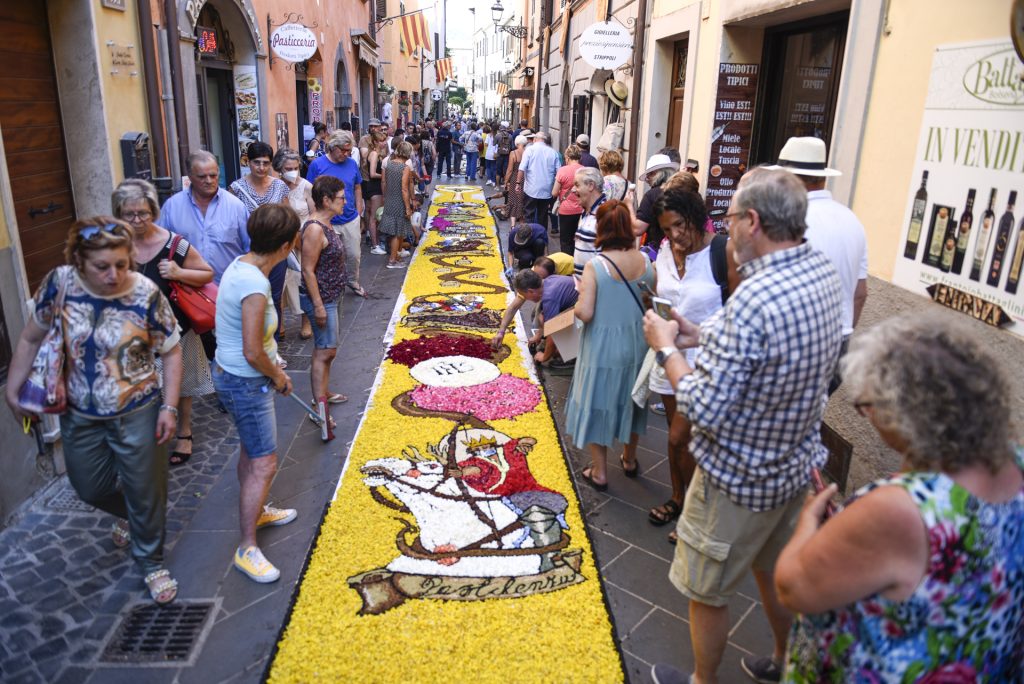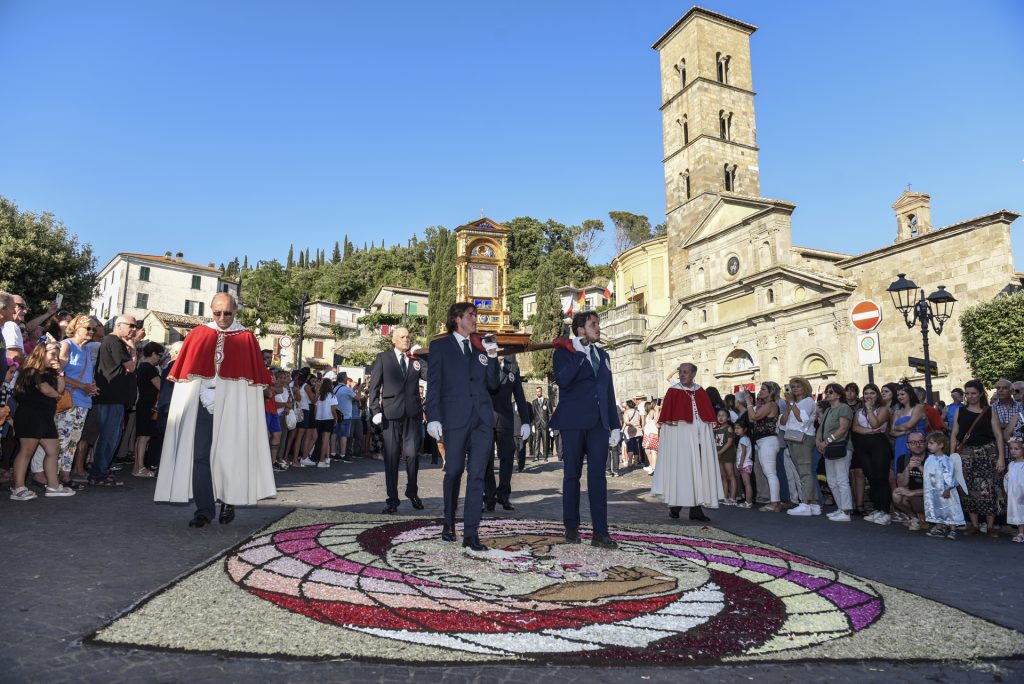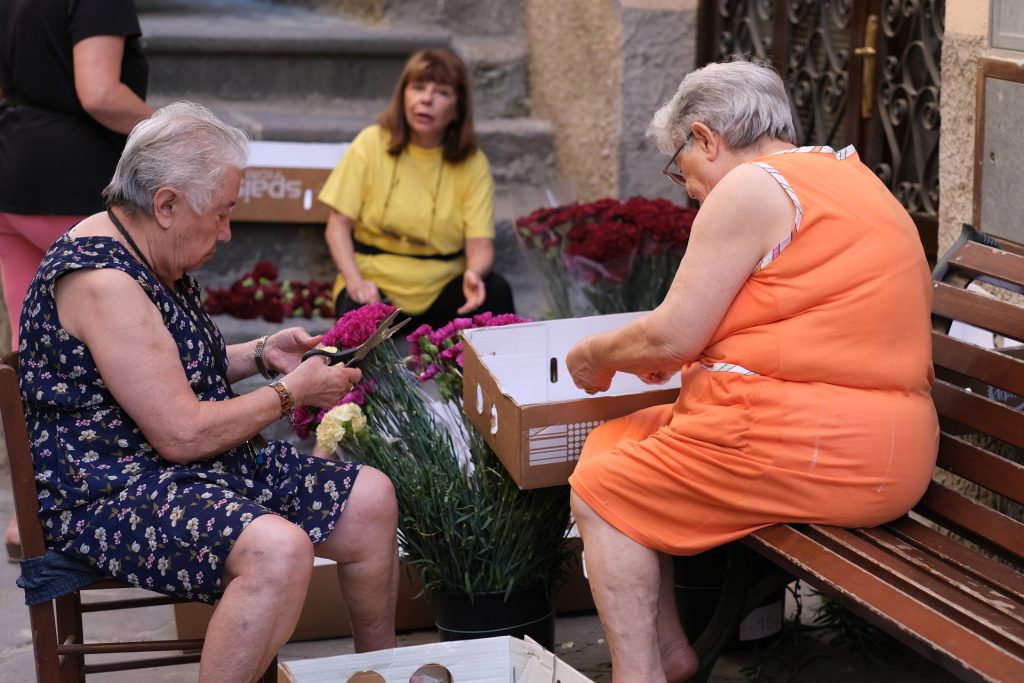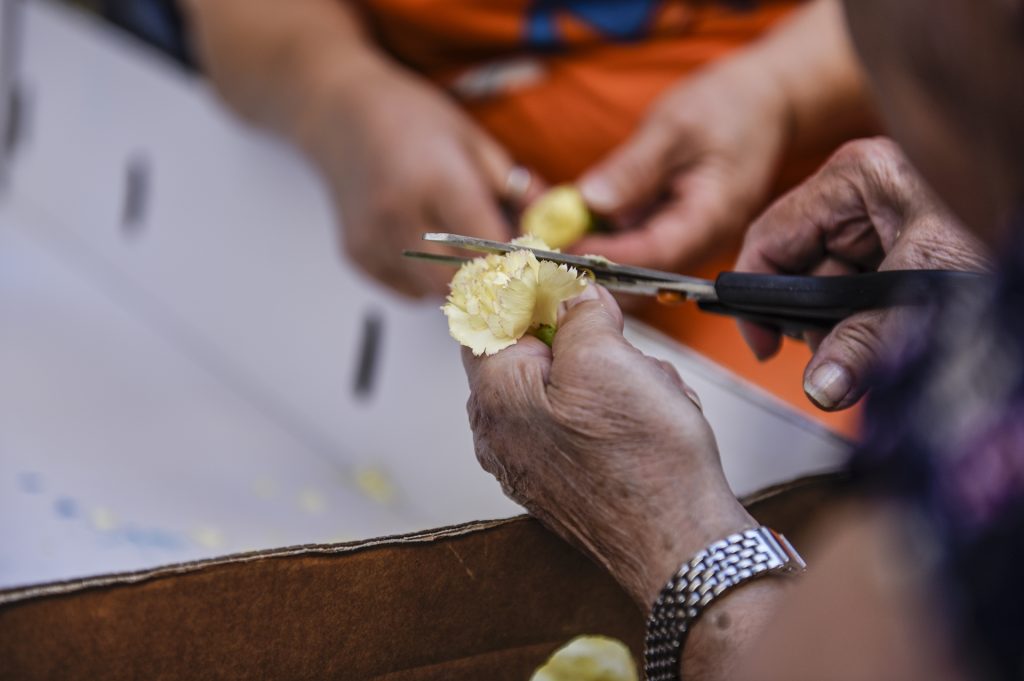Italy is a predominantly Catholic country. Thus, many calendar holidays are linked to church liturgies. They are often accompanied by sumptuous processions through the streets of the towns. Perhaps, many people do not know that the Eucharistic miracle, which established the world solemnity of Corpus Domini, took place in Bolsena. This enchanting village of Tuscia overlooks the shores of the homonymous lake.

The celebration of Corpus Domini is very important in Italy. Usually, the procession is accompanied through the streets by solemn infiorate — suggestive floral carpets depicting abstract or divine images. For over 200 years, the traditional infiorata has been one of the most beautiful events in Bolsena. It is a religious rite but also a folk festival that attracts tourists of all kinds.
A bit of History
The history says that in 1263, a Bohemian priest, assailed by doubts about the real presence of Christ in the consecrated bread and wine, decided to embark on a long pilgrimage of penance and meditation to pray at the tomb of St. Peter in Rome. On his way back, he stopped in Bolsena to celebrate a mass in the Church of Saint Cristina. During the Eucharistic moment of the Holy Mass, a miracle took place. This dissolved all his doubts: the Holy Host bled.
Following this event, in 1264, Pope Urban IV issued the Bolla Transiturus. He extended the celebration of Corpus Domini to all of Christianity.
In Bolsena, the first solemn procession with the relics of the Miracle dates back to 1881.
Is Italy a Catholic country?
If we consider that about 80 percent of Italians and 51 percent of foreigners declare themselves Catholics, it is easy to say that Italy is a predominantly Catholic country. Furthermore, the presence of the Vatican in the heart of Rome strengthens this religious hegemony. However, in Italy, all confessions find their space and are guaranteed by the Constitution.
But what does it really mean to be Catholic in Italy?
Sometimes the boundary between religion or simple cultural identity is very blurred.
Ecclesiastical anniversaries and personal sacraments are sometimes respected more by tradition than by real devotion.
On the other hand, Italians live immersed in the beauty of the priceless historical and artistic heritage that popes and cardinals have commissioned over the centuries. Churches, abbeys, monasteries, sumptuous palaces and art galleries are a precious heritage. They stimulats, in most Italians, a sense of identification with Catholicism, which can sometimes be more cultural than religious.
In Italy, even the secular Catholic solemnities, such as Corpus Domini with its traditional infiorate, can be considered an intangible heritage that is important to preserve in order to maintain the authentic spirit of the country.
Infiorate (Floral Carpets)

Corpus Domini is celebrated in the summer on the second Sunday after Pentecost. After mass, a long procession carries the Blessed Sacrament through the streets of the town, adorned with spectacular floral carpets.
The Solemn Procession of Bolsena stretches for about 3 kilometers (1.86 miles). Many consider that the floral carpet is the longest in the world. A great ferment pervades the inhabitants the day before Corpus Domini. Groups of infioratori (people who create the floral carpets) scatter through the countryside and valleys in search of the most beautiful and colorful flowers to use for decorations: brooms, cornflowers, acacia, poppies, roses, hydrangeas, marigolds, carnations, daisies etc.
The floral artistic designs of the infiorate are very suggestive. The themes are different every year and can portray famous paintings or free images. The predominant colors are yellow, red, green and blue.
Technique used for the drawings
The first step is to make the drawings on paper (sketch) or directly on the pavement. Then, the contours of the images are usually drawn with the coffee grounds.
The third step is to place the flower petals in the gaps of the design. Frequently wetting them with water keeps them moist.
The inhabitants of Bolsena compete amicably to create the most beautiful infiorata.
Overall, Corpus Domini is a religious ceremony. Thanks to the voluntary work of many citizens, stages a wonderful open-air floral scenery.
It is an appointment of the liturgical calendar in which faith, art, and popular traditions come together to give life to a beautiful event that attracts visitors from everywhere.
The Proloco di Bolsena and the Infioratori Bolsena Association are among the organizers of this beautiful annual recurrence.
The event of Corpus Domini is one of the best ways to deepen the knowledge of Italian culture. Between sacred and folkloric, it shows all the authenticity of a country still tied to ancient traditions.
Video by realizzazionesito.com
Collaborative work by Italian Human Connections & Officinavisiva



